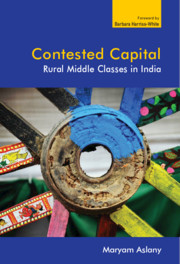Book contents
- Frontmatter
- Dedication
- Contents
- List of Figures and Maps
- List of Tables
- List of Abbreviations
- Foreword
- Acknowledgments
- Introduction: The Problem of the ‘Rural Middle Class(es)’
- 1 Trajectory of the Indian Middle Class: Its Size and Geographical Variations
- 2 In Search of the Rural Middle Classes: From Village Stratification to Rural Household Variations
- 3 Marx: Capital, Labour and the Rural Middle Classes
- 4 Weber: Marketable Capital, Status and the Rural Middle Classes
- 5 Bourdieu: Cultural Capital, Self-perception and the Middle-class Identity in Rural India
- Conclusion: Understanding the Rural Middle Classes
- Appendix A1 Non-farm Occupations in Rahatwade and Nandur
- Appendix A2 Caste and Occupations: The Urban Middle-Class Labour Market
- Appendix A3 Caste and Occupations in Rural India since 1991
- Appendix A4 Caste and Income Distribution
- Appendix A5 Caste and Socio-economic Indicators in Rural and Urban India
- Appendix A6 Caste Composition of Urban Middle Classes in India
- Appendix A7 Caste Composition of the Rural Middle Classes in Maharashtra
- Appendix A8 Household Survey Questionnaire 1
- Appendix A9 Household Socio-economic Survey Questionnaire 2
- References
- Index
Introduction: The Problem of the ‘Rural Middle Class(es)’
Published online by Cambridge University Press: 13 May 2020
- Frontmatter
- Dedication
- Contents
- List of Figures and Maps
- List of Tables
- List of Abbreviations
- Foreword
- Acknowledgments
- Introduction: The Problem of the ‘Rural Middle Class(es)’
- 1 Trajectory of the Indian Middle Class: Its Size and Geographical Variations
- 2 In Search of the Rural Middle Classes: From Village Stratification to Rural Household Variations
- 3 Marx: Capital, Labour and the Rural Middle Classes
- 4 Weber: Marketable Capital, Status and the Rural Middle Classes
- 5 Bourdieu: Cultural Capital, Self-perception and the Middle-class Identity in Rural India
- Conclusion: Understanding the Rural Middle Classes
- Appendix A1 Non-farm Occupations in Rahatwade and Nandur
- Appendix A2 Caste and Occupations: The Urban Middle-Class Labour Market
- Appendix A3 Caste and Occupations in Rural India since 1991
- Appendix A4 Caste and Income Distribution
- Appendix A5 Caste and Socio-economic Indicators in Rural and Urban India
- Appendix A6 Caste Composition of Urban Middle Classes in India
- Appendix A7 Caste Composition of the Rural Middle Classes in Maharashtra
- Appendix A8 Household Survey Questionnaire 1
- Appendix A9 Household Socio-economic Survey Questionnaire 2
- References
- Index
Summary
Granted, nothing raises the academic red flag faster than the concept of the middle class.
—Diane Davis, 2004The epistemic ambition of defining, once and for all, the ‘real’ boundaries of the middle class is doomed to failure because it rests on a fundamentally mistaken conception on the ontological status of classes: the middle class does not exist ready-made in reality.
—Loïc Wacquant, 1991On my second visit to Rahatwade, a small village in western Maharashtra, in May 2015, I am talking, through my research assistant, with a group of men, a meeting arranged by the Village Panchayat. They are curious about my work, bemused to hear of my academic interest in their village. I tell them: ‘I am here to visit middle class households.’ The little of the village that I had seen did not register in my head as qualifying, categorically, to have any middle classes from the conventional theoretical perspectives. So, I threw the question out to them: ‘I was wondering if there are any middle-class families in this village? I would like to talk to them.’ The village guide's response surprised me. He looked around at the group of men, hands outstretched, and said, ‘Don't worry about that madam. We are all middle class!’
This book explores the formation and trajectories of India's rural middle class(es). Studies of the middle class are almost exclusively confined to urban contexts. This is particularly the case in developing countries, where it is assumed that cities, not the countryside, host the process of middle-class formation, effectively eliminating from view large numbers of rural households. Rural societies are rarely analysed in middle-class terms. There are theoretical reasons to explain this. Most influential social theorists, such as Karl Marx, Max Weber, Georg Simmel, Ferdinand Tönnies and Émile Durkheim, assumed a clear social distinction between ‘rural’ and ‘urban’ societies, which in turn created ideal categories that made it possible to theorise the similarities and contrasts between pre-industrial and modernised industrial societies. While cities were assumed to be the chief sites of economic growth, industrial development and modernity, the rural world, embodying something primordial, represented a community that, by virtue of its isolation from the urban-based practices of capitalist development and experiences of modernisation, was considered to be classless by definition, bounded by kinship ties, family lineages, personal networks, and relative isolation.
- Type
- Chapter
- Information
- Contested CapitalRural Middle Classes in India, pp. 1 - 10Publisher: Cambridge University PressPrint publication year: 2020



